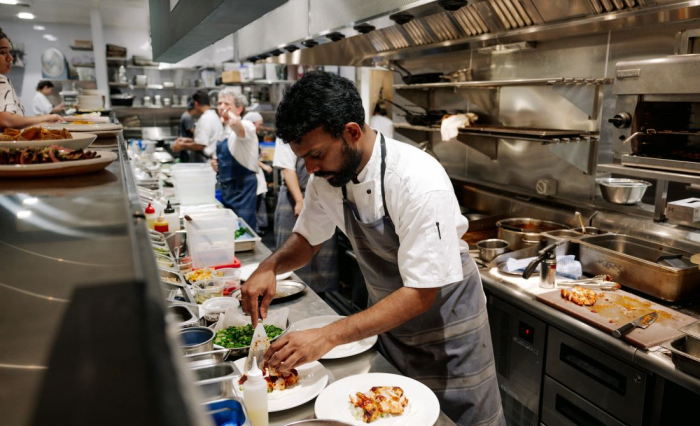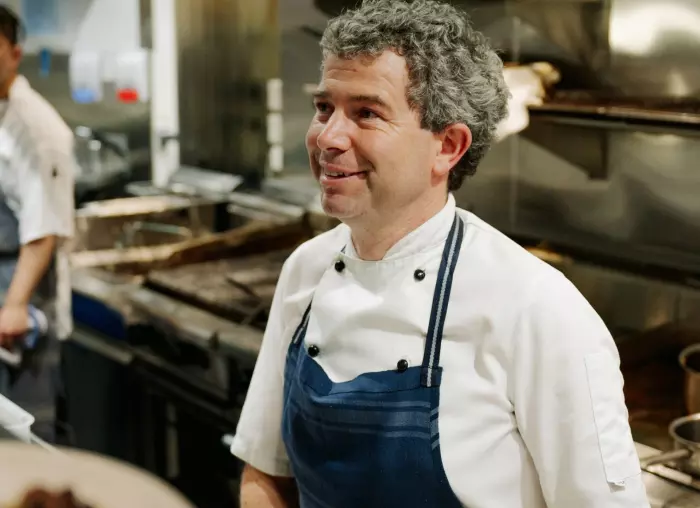Gavin Doyle has stepped into what is perhaps the top cheffing job in the country, heading up the culinary direction across Foley Hospitality's 11 restaurants and bars.
The Irish-born chef has taken the role previously held by Kiwi kitchen luminaries and TV talents Gareth Stewart and Simon Gault.
The conglomerate was previously known as Nourish Group, but Foley Holdings NZ bought the company late last year. It includes Auckland restaurants Andiamo, Jervois Steak House, Soul Bar & Bistro, Talulah, The Brit, The Chamberlain and the spanking-new urban wine-bar experience, Somm.
In Wellington, there’s Shed 5, Pravda and The Crab Shack, with the Queenstown outpost of Jervois Steak House rounding out the offering.
Shoulder-tapped
Doyle has been so busy with the renovation of Soul, the launch of Somm and a perfect storm of labour and supply issues that will be familiar to many businesses that he's only just come up for air, and a quick chat with BusinessDesk.
He says he was quite literally shoulder-tapped to take on Stewart’s executive chef role after the incumbent left in December to pursue opportunities as a consultant chef.
Doyle had been executive chef at Soul prior to Foley taking over but says he was “just left to continue doing what I do as they didn't want to change anything”.
“Out of the blue — I had no idea that he [Stewart] was leaving — Foley's Mark Turnbull came in one day and tapped me on the shoulder.
“He said, ‘I think Gareth's going to be leaving; would you be interested in his job?' And I was, like, ‘Um, okay.’”

Gavin Doyle and his team work the line at Soul. (Image: Foley Hospitality)
Working the line in restaurants is certainly a challenging way to make a crust, but the 39-year-old proves that there is a definite career path through the industry and a reward for hard work.
However, it might be that the reward for hard work in kitchens is, well, more hard work. But he is anticipating a better work-life balance to spend more time with his wife and two young children.
Push new ideas
The plan is, as is so often the case in business, to have the right people in the right places.
“When everything's going well and as it should be, then my job is more creative and keeping things consistent and pushing new ideas in a culinary sense,” Doyle says.
His culinary sense has been excellent from an early age. The Dublin born chef first came to this hemisphere courtesy of the 2008 David Gumbleton Scholarship, awarded during his degree in culinary arts at Dublin Institute of Technology.
This landed him a job in the kitchen of Sydney’s renowned Tetsuya's Restaurant, a frequent entrant in the influential World's 50 Best Restaurants list.
While in Australia, he met his future wife, before travelling back home after his visa ran out.
During a “painful” visa process to get back down under to be near her, he washed up in NZ. He’s since racked up jobs at top NZ restaurants, including Auckland fine-dining hotspot Clooney and hip bistro Ortolana.
Paying top dollar
Doyle's promotion has come with challenges that will be familiar to many large and small business leaders all over the nation.
Following the chronic shortage of chefs (and diners) as a result of NZ's borders being closed because of covid, he has run into a different problem since taking up the reins.
“Finding skilled staff is now the issue, because a lot of people aren't classically trained. They got into cheffing just through their schools or unis or techs, then they do two years at the [cooking] school and they come out and think they're a chef.
“But since all the kitchens are paying top dollar for chefs, their positions and pay are just bumped up and it's diluted the market a little.”
Employer of choice
However, Doyle says the days of the brutal kitchen environments, recently portrayed in flashback scenes of Michelin-starred misery in TV series The Bear, have become something of an anachronism.
“We want to make sure that for the chef behind the scenes, the environment they're working in is better, the money is good, they're getting their breaks, they're getting their time off, so they're actually enjoying their career. Then that will shine through on the plate. We want to be an employer of choice.”
Can cook, will travel
The worldwide demand for chefs means the Kiwi OE can also include working in top restaurants around the globe.
Staging, the French-based euphemism for “unpaid work experience”, has been a rite of passage for chefs around the world, including NZ.
Doyle did a stage at Italian-influenced San Francisco restaurant Flour + Water and says the approach, especially the dough room used to prepare dozens of regional pastas, "changed my career".
The problem with chefs travelling off to the staging hotspots of Europe and the US is you might not get them back.
Young chef 'blown away'
But could “sponsored” staging be a way to send NZ’s talented chefs overseas but get them back at the end?
When Soul closed in April and May for refurbishment, Doyle says they sent one of their young chefs to stage at chef and restaurateur Shane Delia’s Middle Eastern-inspired Maha East in Melbourne.
“He was blown away,” says Doyle. “As a young chef, it opens your mind – the different countries and different processes. You’re always going to pick up something and learn something.”
Doyle says he wants to start sponsoring one chef every year to do work experience in kitchens overseas, with the hope he'll get them back brimming with new ideas. “I’ll be communicating with the chefs overseas, and they can send their chefs over to return the favour and we’ll hopefully teach them a few things.”
Changing of the guard
However, changing labour laws worldwide mean that the era of traditional staging is probably coming to an end, and that is having a seismic effect on the fine-dining restaurants around the world.
Doyle describes a visit years ago to Copenhagen’s Noma, the three-Michelin-starred restaurant that shifted the gaze of haute cuisine aficionados off France and Spain and pointed it hungrily north.
Acclaimed head chef René Redzepi, widely credited with reinventing Nordic cuisine, took Doyle and his wife for a tour of the restaurant and mentioned that they had an army of 40 "stagiaires" rotating though the kitchen every three months.
Redzepi later started paying this cohort of free workers – with the end result, Doyle says, that the Dane announced last year that his business couldn't continue to operate and will shut down in 2024.
Suck up knowledge
If you’ve ever seen cooking shows of ultra-high-end restaurants and teams of chefs labouring with tweezers, blowtorches and cloches over a single plate, you’ll understand the problem.
Doyle thinks it’s “very true” that they couldn’t do this without the free labour.
“You’d work for free, put your head down and suck up as much culinary knowledge as possible – and that was your payment.
“I think that’s all going to change. Noma has now openly admitted that they can’t do this. I think there will be a real shift in these experiences.”
He says the passion and drive of chefs, sommeliers, waiters and restaurateurs to push the boundaries of fine dining will always exist, but if you thought that experience was expensive now, these might be the good old days.
“I will still dine in their restaurants, but maybe not as often.”
Quality issues
Many restaurants survive on razor-thin margins, and rising labour costs are just one challenge among many. The recent weather issues affecting the motu, unappetisingly teamed with inflation, have done for the pantry what covid did to the chefs’ line.
“It’s hurting us. Not only has all produce risen – the meat, fish, vegetables, salads – but there can be quality issues, perhaps because there are not enough pickers in the orchard or farmers on the farm," Doyle says. "We could have broccolini today, but not tomorrow."
Pre-covid, he would have a detailed menu and special items at Soul, but supply issues have meant they have become more fluid – broccolini now might be “brassicas” on the menu, to provide a bit of breathing space.
Doyle says this avoids having to tell staff to inform customers that items have fallen off the menu, which affects the customer experience.
Perfect storms and big bratts
This “perfect storm” of labour shortages, inflation and actual storms has created challenging times for executive chefs as they re-cost and re-budget, which has flow-on effects to menu prices. “It’s very difficult and time-consuming; it’s hard to deal with.”
In a slightly unpalatable irony for Doyle, the move into his new role, and corresponding challenges, have happened while his old base at Soul has undergone a major kitchen refurbishment.
The refresh has been in the works for nearly three years, but various delays have meant it started only in April. While he says he’ll miss the chance to work intimately in the new kitchen – “it’s absolutely out of this world; it’s better than I expected” – there are a few new toys that have him creatively excited.
Top of the list is a 100-litre pressurised bratt pan. If you wondered why restaurant food always tastes better than anything you could cook, pricey kit like this is one of reasons. “It’s way beyond my imagining; you can do things better than anyone else who doesn’t have one of these.”
Doyle makes it sound like the Swiss army knife of appliances: “It has more surface area to cook things, it can be a grill, it can be a fryer, it can be a steamer, it can boil things, and has a pressure-cooking function.
“When we used to do a veal stock, it usually took us about 18 hours. We can do it in two and a half hours now with this piece of equipment and it comes out much better because of how the machine operates.”
Near-slavish devotion
Another reason restaurant food is so much better is a near-slavish devotion to hunting down new and interesting ingredients or better suppliers.
This can range from haunches meat down to the humble seed – in this case, Doyle says, fennel seeds. His recent score of 30kg of organic fennel seeds grown near Mt Ruapehu – “super aniseed-ey, borderline liquorice and star anise” – has him excited.
“I’m able to make amazing fennel ice cream or use the seeds in a crayfish bisque – they’ll have a little home in the background.
“Other restaurants have access to it, but they just don’t know it’s out there. It just makes our dishes taste that bit better than others.”
Likewise, he sings the praises of French-Kiwi cheesemaker Anabelle David’s goat’s milk fromage frais, which he has just started using at Soul. From a goat herd in the Bombay Hills to her workshop in Auckland, Doyle says it’s a product so good it shines through on the plate.
And then Somm
Along with a whistle-stop tour of the NZ Foley restaurant empire earlier in the year, then juggling the refit at Soul, Doyle has also helped to launch the group’s latest offering, Somm, at Auckland’s Princes Wharf.
The concept and motivation are pretty simple if you’ve followed billionaire US businessman Bill Foley’s acquisitions in Aotearoa – he’s swimming in wine.
For Somm’s urban cellar-door experience, Doyle says the menu plan – “snackable, moreish, shareable” – wasn’t about matching dishes to particular grape varieties but making them enjoyable across the extensive options in the Foley portfolio.
But the cheeses on their antipasti match the regions of the wines, and the First Light wagyu uses Bannockburn jus made from Mt Difficulty pinot noir.
Conscious of the Auckland love affair with pizza, they have a poolish dough, fermented for 72 hours, which gets super-crispy and light in a stone-baked oven ratcheted up to 340°C. It takes just four minutes to cook and, with your glass of wine, “you’re a happy person”.











